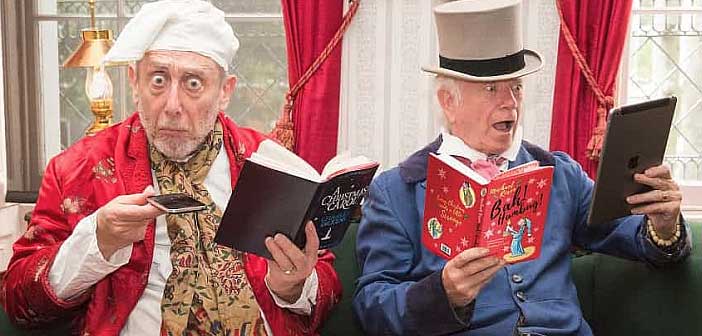The consequences of inequality are “as deep now as they were in Victorian times”, says children’s author and poet.
Source: The Guardian
Some 174 years after Charles Dickens forged his outrage at poverty into the quintessential festive story, the former children’s laureate Michael Rosen has reimagined A Christmas Carol for a new age of austerity defined by the neo-Victorian belief that “poverty is caused by poor people”.The children’s author and poet’s new version of A Christmas Carol, Bah! Humbug!, illustrated by Tony Ross, sees schoolboy Harry Gruber take the role of Scrooge in his school play, while his miserable, work-obsessed father snipes from the sidelines.
According to Rosen, most retellings of A Christmas Carol “dispense with why Dickens wrote it in the first place”. Dickens was moved to tell the story after his visit in 1843 to a central London school for slum children, and by the Children’s Employment Commission’s damning report into child labour. He originally planned to write a pamphlet, but turned to fiction instead, publishing A Christmas Carol later that year to what his biographer Claire Tomalin has called “rapturous approval”
“Dickens wrote it because he was appalled when he saw children and the way they were treated,” said Rosen.
Scrooge, asked to make “some slight provision for the Poor and Destitute, who suffer greatly at the present time”, responds: “Are there no prisons? … And the Union workhouses? … Are they still in operation?” If many “would rather die” than go there, Scrooge continues, then “they had better do it, and decrease the surplus population”.
Contemporary politicians who talk about “shirkers and workers”, Rosen continued, are buying into the same mindset. “The dominant view of the time is really not that different from the one expressed by Iain Duncan Smith when he brought in universal credit, which is that poor people are poor because it’s poor people’s fault.”
Dickens’s conclusion, that we should “be nice to each other and enjoy Christmas”, isn’t really a practical solution, Rosen added, but it’s a novelistic way of “satisfying us when we look at it. Taking Scrooge through his life in a way is a great way of saying, ‘Look at how you got to where you are’, so he actually forces you to think about society instead of blaming poor people for poverty. It’s a stunning book, really.”
In Rosen’s version, Harry’s father Ray “reflects an aspect of the cruelty of Scrooge – if only you could just get rid of these people. It’s a very nasty thought he has, and I wanted it to echo the Malthusian idea Scrooge has, that somebody who is a nice, decent, middle-class bloke could have these almost exterminatory ideas about poor people. I wanted the echo to go from the 19th century to the 21st in Ray Gruber’s mind.”
Readers in Dickens’s time were deeply affected by his novels, Rosen added, “by seeing how, for children in particular, poverty was being dealt with totally inadequately by Victorian society”.
Things are not really much better today, said Rosen, who is an outspoken critic of the government. “[The Victorians] had a thriving economy and desperate, widespread poverty. I see that in a sense as happening now – you see people on the telly every night telling you the economy is good while we have food banks.”
The consequences of inequality are “as deep now as they were in Victorian times”, said Rosen. “The problems people have, whether it’s with diet or access to education, access to certain kinds of knowledge, are desperate, absolutely desperate. We keep underestimating it and tidying it away. I walk past our local church and there’s a queue for the food bank. What is that? That’s in what people say is a relatively prosperous area. The fact that the church is supplying food for people to survive is extraordinary. If you think of the accumulated wealth since 1780, the beginning of the industrial revolution – where has it all gone? Why hasn’t it provided for everybody to live with a decent per capita income and jobs? They talk about it like a success but to me it looks like abject failure.”
Rosen’s editor at Scholastic UK, Linas Alsenas, said that retelling a book as “universally beloved” as A Christmas Carol “was always going to be a risky proposition. If you’re going to do it, you have to do it right.” But he added that Rosen and Ross’s new version “really nails the big question that Dickens posed: Does the drive to make money have to come at the expense of family life? It’s a problem each of us wrestles with, no less today than in the Victorian era.” And, he continued, “it’s funny”.
- Bah! Humbug! By Michael Rosen, illustrated by Tony Ross, is published by Scholastic
.

